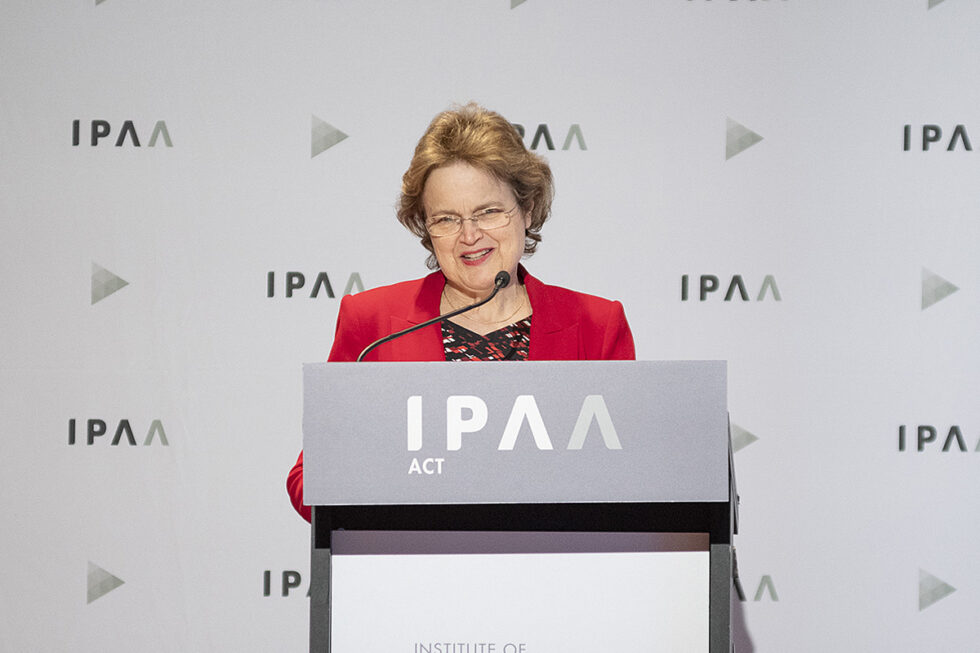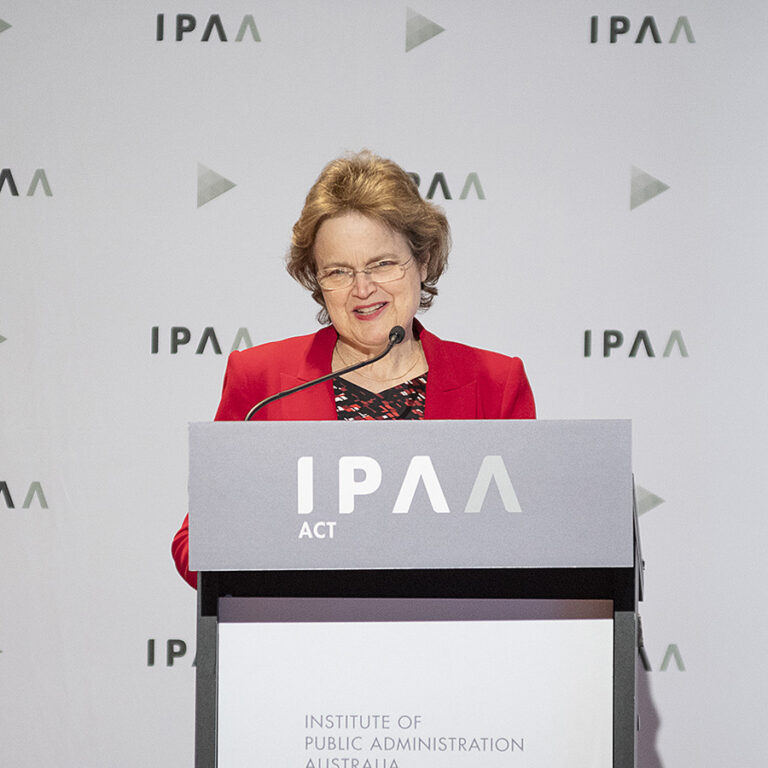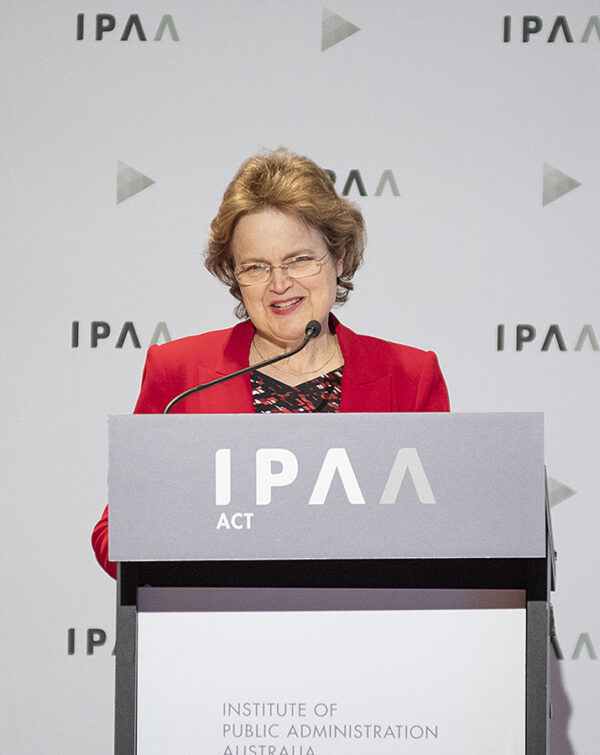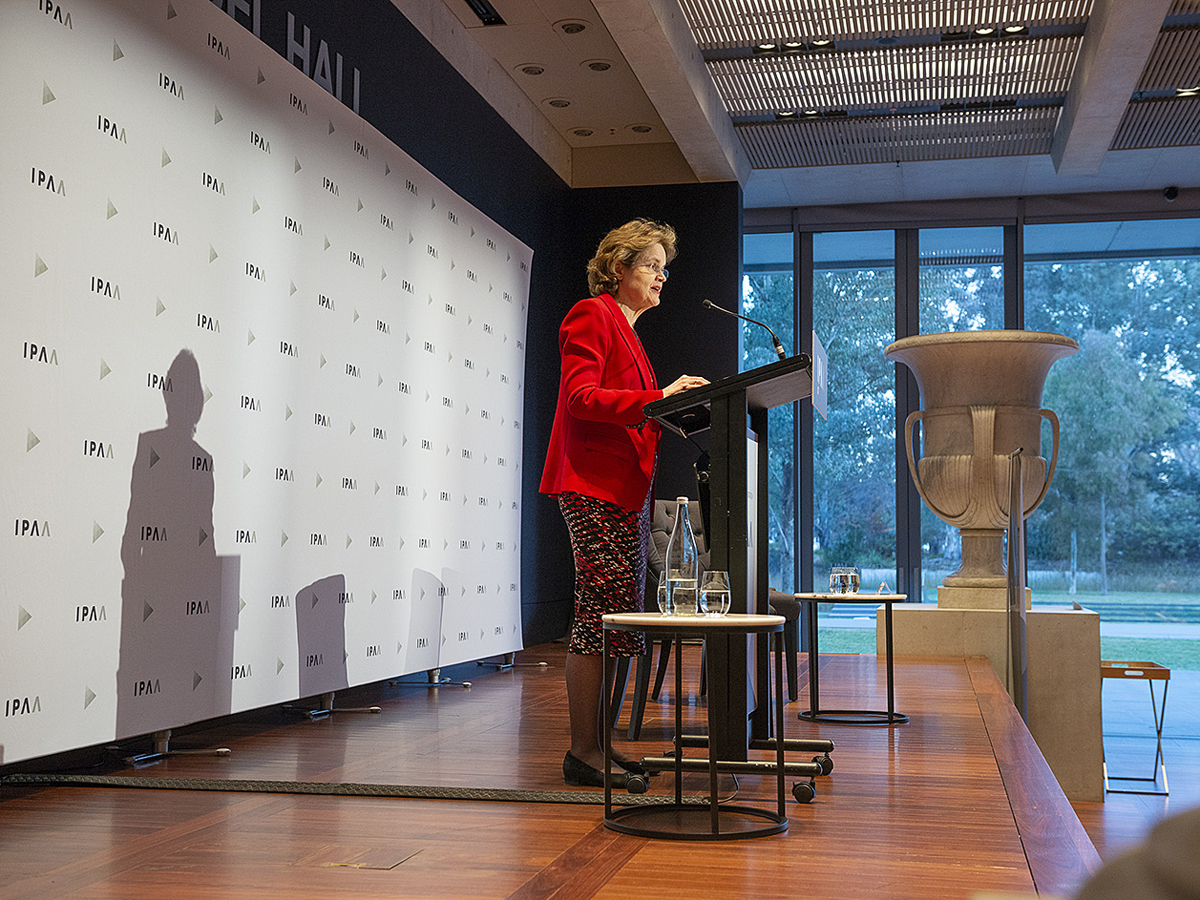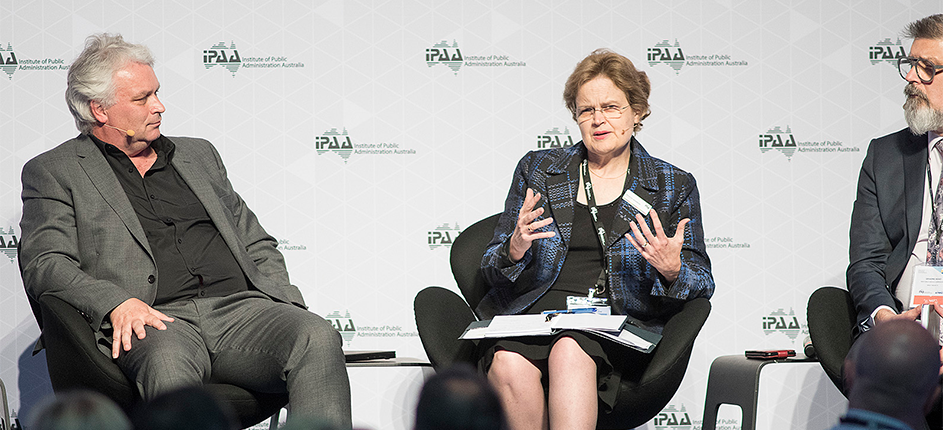It is important to not only understand the immerse sense of self-achievement and altruism you will get from helping a mentee, but you will also benefit in a variety of ways. As a mentor, you can enjoy many benefits, including:
There are so many benefits of using mentoring in career development, including the following:
View the full document and Mentor / Mentee Commandments here.
References
Mentoring Complete 2021, Mentoring Benefits, Mentoring Complete, viewed 14 September 2021, <https://www.mentoringcomplete.com/mentoring-benefits>.



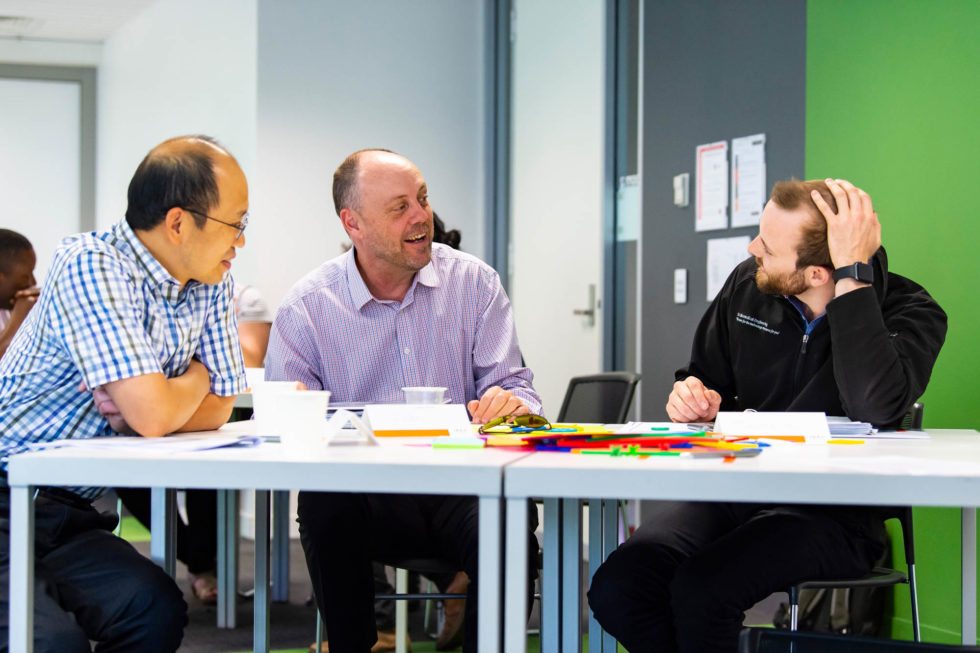
If you want to find out more click here, or contact us if you would like to speak to a team member.
The Institute of Public Administration Australia is pleased to announce that funding has been awarded to three new public administration research projects.
The grants from the Public Administration Research Trust Fund — which IPAA manages in partnership with the University of Canberra’s Centre for Change Governance — will support research into the ethical application of artificial intelligence, the career pathways of Federal ministerial staff once they leave a minister’s office, and the capabilities associated with the implementation of social procurement.
Caroline Walsh, IPAA’s National Executive Director, said that the three research projects will deliver real-world insights for public servants and those involved in the wider public purpose sector.
“We are really pleased to be able to support these research projects into areas of public administration that are topical and important to the profession, not only now but into the future.”
Grants were awarded to:
Professor Darren Sinclair, Director of the Centre for Change Governance at the University, said that the partnership demonstrated the benefits of university collaboration with a member-based organisation like IPAA that promotes excellence and pride in public service across Australia.
“Public administration is undergoing a period of rapid transformation, with the advent of digitisation and big data, together with new and demanding challenges such as COVID-19, and the need to addresses integrity, diversity and inclusion.
It is more important than ever, therefore, for academics to provide research insights to practitioners — this can only happen with funding, which the IPAA has generously provided to three excellent projects”.
The research findings from these projects will be made available by IPAA and the University of Canberra in due course.
More information on the research fund is available from the Public Administration Research Trust Fund page on IPAA’s national website.
To see original article, visit the IPAA National website here.



The term ‘Emotional Intelligence’ entered our management vocabulary in the late 90s and is now part of the vernacular in most workplaces. Despite this 20 year ‘history’, there is still much debate about what it is…and isn’t.
Emotional Intelligence (EI), also known as Emotional Quotient (EQ) is a person’s ability to understand and manage their own emotions. Having this understanding will help to better manage stress, communicate effectively, empathise with others and defuse conflict by having better social awareness. There are 5 key elements which help to define emotional intelligence:
According to the Global Talent Trends 2020-21 Report by Mercer (2021), the Top 3 Critical Skills for Future Resilience are Adaptability, Collaboration and Inclusive / Empathetic Management. It will therefore be vital for managers to develop their own emotional intelligence to better manage their own decisions and actions. By having greater self-awareness, managers are better equipped to support their team and foster stronger relationships.
It is important to have relevant technical skills to perform your work role effectively , however as we become less physically connected it has become even more important to have strong interpersonal skills.
To learn more about Emotional Intelligence and how you can create a positive EQ/EI workplace, register for our Emotional Intelligence course which is part of our our Emerging Executive Development Series. This half day program will review the dominant theories and explore the agreed aspects of EI/EQ and how participants can enhance their competence in this critical business skill.
References
Janove, J 2020, ‘Leaders and Employees Need Soft Skills Now More than Ever’, SHRM, viewed 17 August 2021, <https://www.shrm.org/resourcesandtools/hr-topics/employee-relations/humanity-into-hr/pages/covid-19-soft-skills-at-work.aspx>.
Mercer 2021, ‘2021 Global Talent Trends Study’, Mercer, viewed 17 August 2021, <https://www.mercer.com/our-thinking/career/global-talent-hr-trends.html#contactForm>.



Dr Alex Antic is a leader, consultant and advisor on analytics, data science and artificial intelligence, and will speak at the 2021 IPAA National Conference, Riding the Wave of Service Transformation, being held in Brisbane on 14–15 October 2021.
Alex has more then 18 years post-PhD experience and knowledge in areas that include advanced analytics, machine learning, artifical intelligence, mathematics, statistics and quantitative analysis, developed across multiple domains: Australian and State Government, Asset Management, Insurance, Academia, Banking (Investment and Retail) & Consulting.
In 2021 Alex was recognised as one of the Top 5 Analytics Leaders in Australian by the Institute of Analytics Professionals of Australia. He also holds several senior advisory roles across industry, government, start-ups and academia.
Alex has a PhD in Applied Mathematics, First Class Honours in Pure Mathematics, and a double-degree in Mathematics and Computer Science.
The 2021 IPAA National Conference will be delivered at Brisbane’s Hilton Hotel, with live stream tickets available for those unable to attend in person.
Early bird tickets are available until 31 August 2021. For tickets and more information, visit the 2021 IPAA National Conference website.
Original article from IPAA National Website.



Dr David Rock from the NeuroLeadership Institute is set to deliver a keynote address at the 2021 IPAA National Conference this October.
Neuroleadership has come into the spotlight in recent years, with Dr Rock, in fact, coining the term ‘Neuroleadership’ in recognition that a more concrete, science-based approach to growing soft skills would not just resonate with organisational leaders but also make any change initiative more effective.
Applying Neuroleadership Approaches to ‘Ride the Wave of Transformation’
The theme of this year’s National Conference ‘Riding the Wave of Transformation’ will reflect upon the opportunities and changes we have faced as a public service in recent times, and what the future might look like. Neuroleadership approaches to leadership can provide us with new ways to build a positive culture in the workplace that enhances performance and outcomes by understanding the innate psychological principles influencing the behaviour and responses of staff.
In this article ‘How you can apply Neuroleadership to manage others’ we explore the key principles of neuroleadership at a glance. As a topic that many of us might have encountered at only a cursory level, it’s important to understand how this area of leadership development can help you in leading teams or organisations that are engaged, satisfied, productive and motivated. The vital principle of the ‘threat – reward’ response illustrated below highlights the positive outcomes of environments that put our brains in the reward state, and in turn, the adverse effects of perceived threats in the environment.
You can take the next steps in applying neuroleadership principles to your leadership style with several opportunities coming up…
The NeuroLeadership Institute is now a 23-year-old cognitive science consultancy that has advised more than 50% of the Fortune 100. With operations in 24 countries, the Institute brings neuroscientists and leadership experts together to make organisations better for humans through science. David has a professional doctorate in the Neuroscience of Leadership, and is the author of four books including Your Brain at Work, a business-bestseller. He has written for and been quoted in hundreds of articles about leadership, organizational effectiveness, and the brain which can be found in Harvard Business Review, The New York Times, The Wall Street Journal, Business Insider, CNBC, Forbes, Fortune, Inc., USA Today, BBC, The Boston Globe and more.



In April 2021 IPAA SA were thrilled to be supporting the Environment Protection Authority (EPA) in the delivery of the 2021 EPA Board Summit on the topic of ‘Climate Change: Risks, Liabilities and Remedies’.
This online event was co-hosted with the EPA in collaboration with AiGroup, and was held over 2 sessions.
Growing our understanding of Climate Change and its impacts on our state is valuable and relevant to every South Australian state government department and organisation. This event presented some fascinating and insightful reports and presentations that are now accessible to the public.
This event also included the opportunity for Q&A with the above speakers and exploration of two case studies from AGL and City of Adelaide on how they are adapting to climate change.
You can access the full event resources and recordings here.


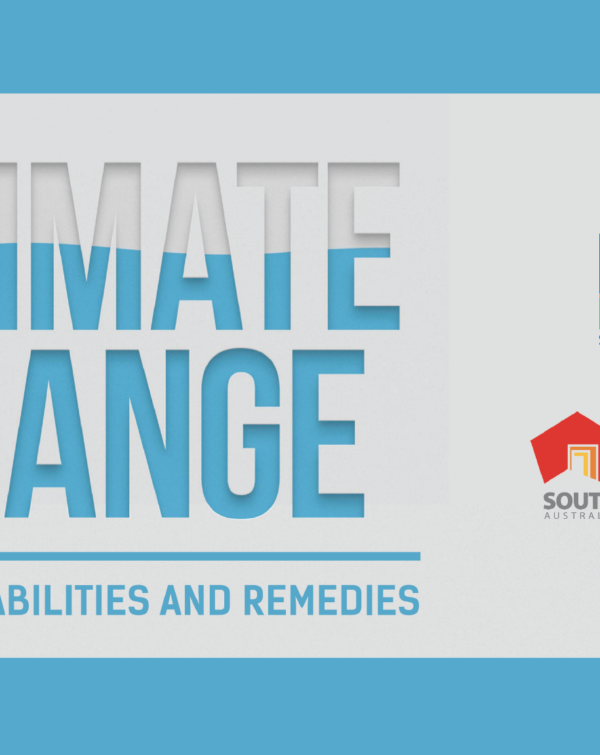
The Institute of Public Administration Australia is pleased to announce that the 2020 Sam Richardson Award — for the most influential paper published in the Australian Journal of Public Administration in 2019 — has been awarded to Associate Professor Jeannette Taylor from the University of Western Australia.
Associate Professor Taylor’s award-winning paper ‘What causes employees to whistle while they work? Factors affecting internal whistle-blowing in the Australian Public Service’ was published in December 2019, and examines the impact of the nature of corruption, organisational culture, and employees’ work attitudes and actions on internal whistle-blowing in the APS.
Associate Professor Taylor’s paper was assessed by a judging panel that included leading public administration academics, representatives of the Institute of Public Administration Australia (IPAA), and young professionals from across the IPAA Divisions.
IPAA National President, Dr Gordon de Brouwer PSM, said that Associate Professor Taylor’s paper was original, innovative, topical and well-crafted.
‘It speaks to real life work problems for those in the public sector and is also an excellent, well-grounded paper with good empirical work and strong academic credentials.
The panel members were unanimous in their decision, believing that it makes an important scholarly contribution to theory as well as a practical contribution to public administration’.
Aashna Rampal, an Assistant Policy Officer with the NSW Department of Planning, Industry & Environment, was one of the members of the judging panel who assessed six short-listed papers for the Award and made the following observation of its universal value:
‘You don’t need to belong to the Australian Public Service or the public sector to be able to absorb the paper’s content, the data, the discussion and the evidence that’s backing it up.
Wherever you work culture is so important and its focus on culture is readily transferrable.’
It is expected that Associate Professor Taylor’s award-winning paper will have a significant and positive impact on public sector leaders and public servants across Australia.
Further information on the award, including past winners, is available from IPAA’s national website.



Chief Executive of the Department of the Premier and Cabinet, Nick Reade joined us for an insightful conversation to share his focus and agenda, as well as some leadership lessons and advice for emerging and current leaders in the sector.
Nick has a wealth of experience from across the South Australian business sector and has a passion for innovation and growth, which has been reflected across his previous roles in finance and banking.
For all developing and existing leaders, “Education is absolutely critical,” Nick said.
“Not only does having continuous education help you progress and perform, but it also impacts how others perceive you. Focusing not only on our technical skills; though these are undoubtedly essential; it is vital to build skills that will increase your credibility and confidence,” he said.
Nick’s advice is to look for opportunities for growth. By furthering his learning in strategic development, his leadership potential grew, and his confidence increased as others acknowledged his credibility and insight. Nick also shared that seeking feedback from others can be very beneficial when deciding what avenues of education to pursue.
“Sometimes we don’t always see these growth areas ourselves.”
“Having an outside source to help you identify these will assist you in planning your next steps towards education and professional development.”
From Nick’s experience as a leader, he says being strategic and collaborative is essential to leading others, as well as setting a light on the hill to guide your people. Strategic goal setting drives a collaborative approach and can help give teams a joint sense of purpose with clear outcomes.
Developing or current leaders can apply this concept to many situations that arise in teams and organisations. The mindset focuses on being able to think strategically about identifying and reaching goals.
“How you are going to get your team to arrive at the destination ‘with you’?” Nick propositioned.
Looking back at his time in the banking sector, Nick reflected on some decisions made and measures taken to ensure organisations in his leadership continued to grow and thrive. He said that whilst he initially felt the anxiety and worry from these tough choices, making these decisions were for the benefit of the organisation, allowing it to continue to deliver stronger and better services. For leaders, this highlights the importance of understanding that you will sometimes be called on to make hard decisions, but to have courage and belief in what you are doing.
In Nick’s own words “Never chase the next thing.” It’s important to get down to work and focus on the job you are doing now and to put all your effort into that, rather than always focusing on the job you may have next. In his experience, excelling at your current role will give you access to more opportunities in the future, as others will want to ‘come to you’ as they value your work ethic, capability and commitment.
Engaging in mentorship is very valuable in Nick’s opinion, and can be a great help in sharing and seeking advice, whilst benefiting from others’ experiences. A sponsor, however, is a little bit different.
Though they can be similar, and mentors can become your best sponsors, the main difference is that sponsors are people that will advocate on your behalf to help you access new opportunities, giving you a real boost to your career.
Finding a sponsor can be challenging, but can be mutually beneficial. Showcase your capabilities and commitment by delivering for others who you may be already working with in some capacity, to demonstrate your value to potential sponsors to inspire them to open doors for you to walk through.
If you are interested in exploring mentorship we encourage you to get involved with the IPAA SA Personal Member Mentoring Program as either a mentee or a mentor.
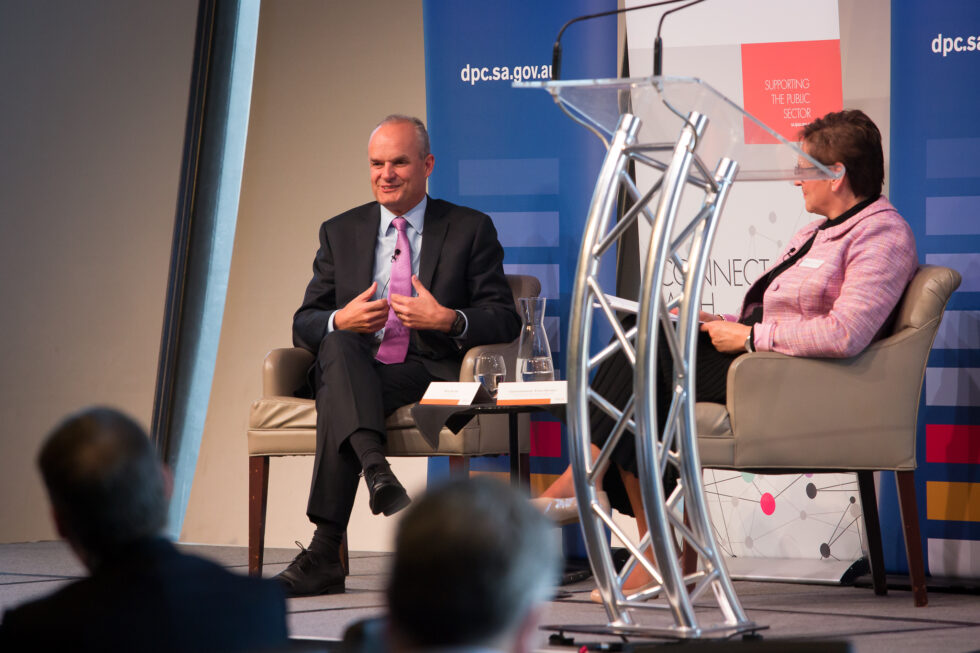
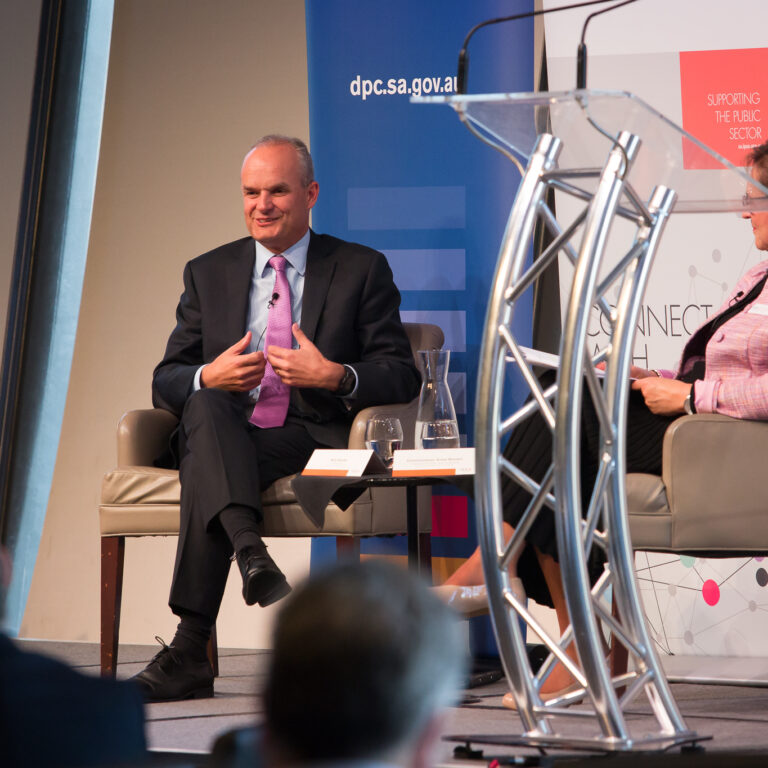
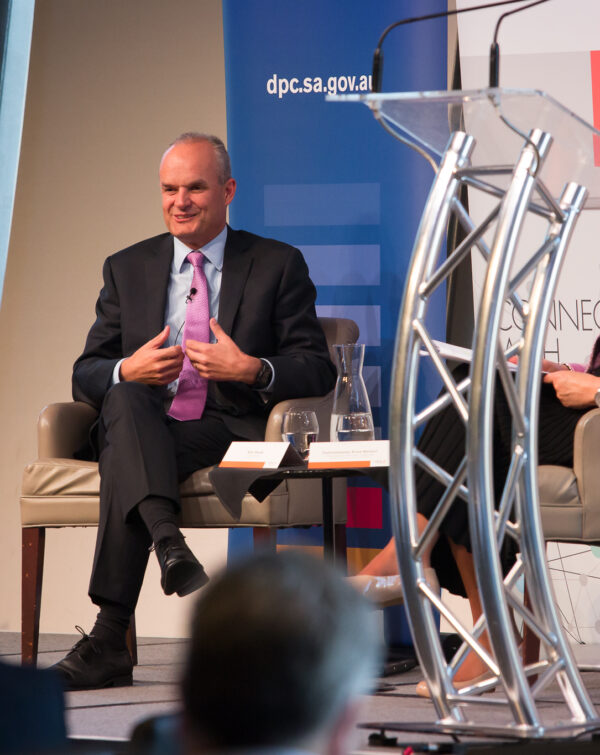
Networking is an effective career development tool that provides access to opportunities that may not be available through other career development methods. Networking is an effective way to keep up to date with industry trends, develop relationships, reveal promising business opportunities, and foster the development of skills and knowledge. Whether you are attending a formal or informal networking event, the following tips can help you maximise the positive benefits associated with networking.
Although it is not always possible to identify who will be in attendance prior to an event, if the opportunity presents itself, it is worthwhile pursuing as promising networking opportunities may reveal themselves. This will assist in creating a networking strategy to inform who you specifically want to connect with. This will help cut through the clutter and make your networking more efficient. By not preparing, you may miss out on potential opportunities if you are unable to identify people of interest during the event. If you do not have the resources to identify who will be in attendance, ask people within your network to see if they have insight.
Waiting for other people to come and talk to you at networking events limits your chance of connecting with new people and being exposed to opportunities. Of course, the idea of going up to strangers to engage in conversation can be quite intimidating. However, it is important to remind yourself that most people who attend networking events are genuinely interested in meeting new people and learning about them. Preparation also makes this easier, as it is more difficult to introduce yourself to someone who you know nothing about than it is with someone you have some basic insight on.
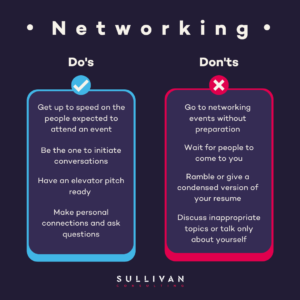
The Do’s and Dont’s of Networking
When talking to new people, you are almost guaranteed to be asked some variant of the question “who are you and what do you do?” or the dreaded “tell me about yourself”. When put on the spot, it can be challenging to respond to these prompts in much detail. As such, many people either keep their answers brief and forgo important details or give extended responses that are not succinct. To avoid this, prepare a short ‘elevator pitch’ that includes the basic details of who you are and what you do. Be sure to also include your unique selling point. This may relate to skills you possess that are unique within your industry, your experiences, or any awards/accolades you have earned. Just be sure not to be too static or scripted in your delivery!
Have you ever been stuck in a conversation with someone that has only been interested in talking about themselves? Keeping yourself as the focus of conversations is one of the quickest ways to disengage with people and limit your chances of developing long-lasting relationships. While it is important to talk about yourself so that others can get to know you, it is equally important to ask questions of others so they have the chance to do so as well. Not only will this improve their engagement in the conversation and opinion of you, but it is also an opportunity to learn about them, their experiences, and their knowledge, which may provide worthwhile insight.
For more career development advice, be sure to follow SULLIVAN Consulting on their social media platforms.



Last week Premier Steven Marshall announced the appointment of Ms Frances Adamson as the next Governor of South Australia.
Ms Adamson has a wealth of experience which will contribute to a bright future for the state and we are particularly proud to note her previous service as the President of IPAA ACT, as well as her status as a Fellow of the Institute of Public Administration Australia (FIPAA).
A number of both national and IPAA ACT events have featured Ms Adamson’s insights, including:
We encourage you to explore some of above past events to give you insight into the knowledge and value Ms Adamson will bring to the position of Governor. If you would like to learn more about some of IPAA’s other distinguished fellows you can access a full list of National Fellows here.
